Mattress Lifespans: How Long Should You Keep a Mattress?

But is not replacing your mattress smart? Not necessarily. You spend over a third of your life sleeping, which means you’re getting a lot of use out of your bed. This means your mattress will begin to wear out over time, which can lead to inadequate sleep and even health problems. So, how long do mattresses last, and when should a mattress be replaced? Learn more in our guide to mattress lifespans below.
- How Long Do Mattresses Last?
- When Should You Replace Your Mattress?
- Factors That Affect a Mattress’s Lifespan
- How to Prolong the Lifespan of Your Mattress
- Layla Sleep Mattresses
- Key Takeaways: How Long Does a Mattress Last?
How Long Do Mattresses Last?
The average mattress lifespan lasts anywhere from seven to ten years. You already know the importance of sleep, but your mattress is one of the most important contributing factors to your sleep quality. Without the right mattress, you’ll wake up with aches and pains, or you won’t be able to get the sleep you need every night.

How often to replace a mattress depends on several factors, including age, sagginess, comfort, and even noise. This article will discuss when it’s time to replace your mattress, factors that affect your mattress’s life expectancy, and how to prolong your mattress’s lifespan.
How long do mattresses last by type?
How long a mattress lasts depends on the type of material used in the mattress. Some mattresses only last for a few years, while others can last more than a decade. While the quality of the material will affect how long a mattress lasts, it also depends on how often the mattress is used and a variety of other factors. Here’s the average lifespan of a mattress by the type of mattress.
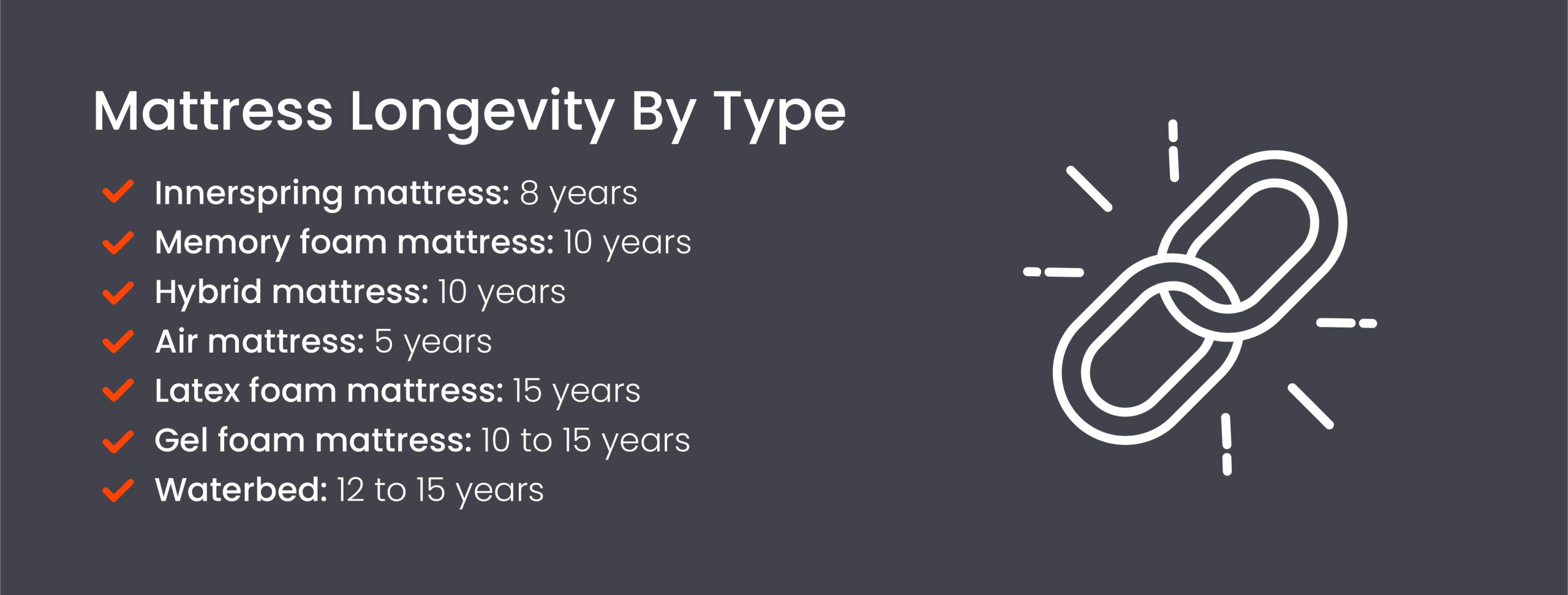
- Innerspring mattress: 8 years
- Memory foam mattress: 10 years
- Hybrid mattress: 10 years
- Air mattress: 5 years
- Latex foam mattress: 15 years
- Gel foam mattress: 10 to 15 years
- Waterbed: 12 to 15 years
When Should You Replace Your Mattress?
Knowing when to replace your mattress can help you get better sleep. However, you can’t simply decide to replace a mattress based on age alone. While your mattress might be seven years old, that doesn’t mean you have to go out and buy a new one, especially if you’re sleeping well. Instead, you should replace your mattress based on these factors:
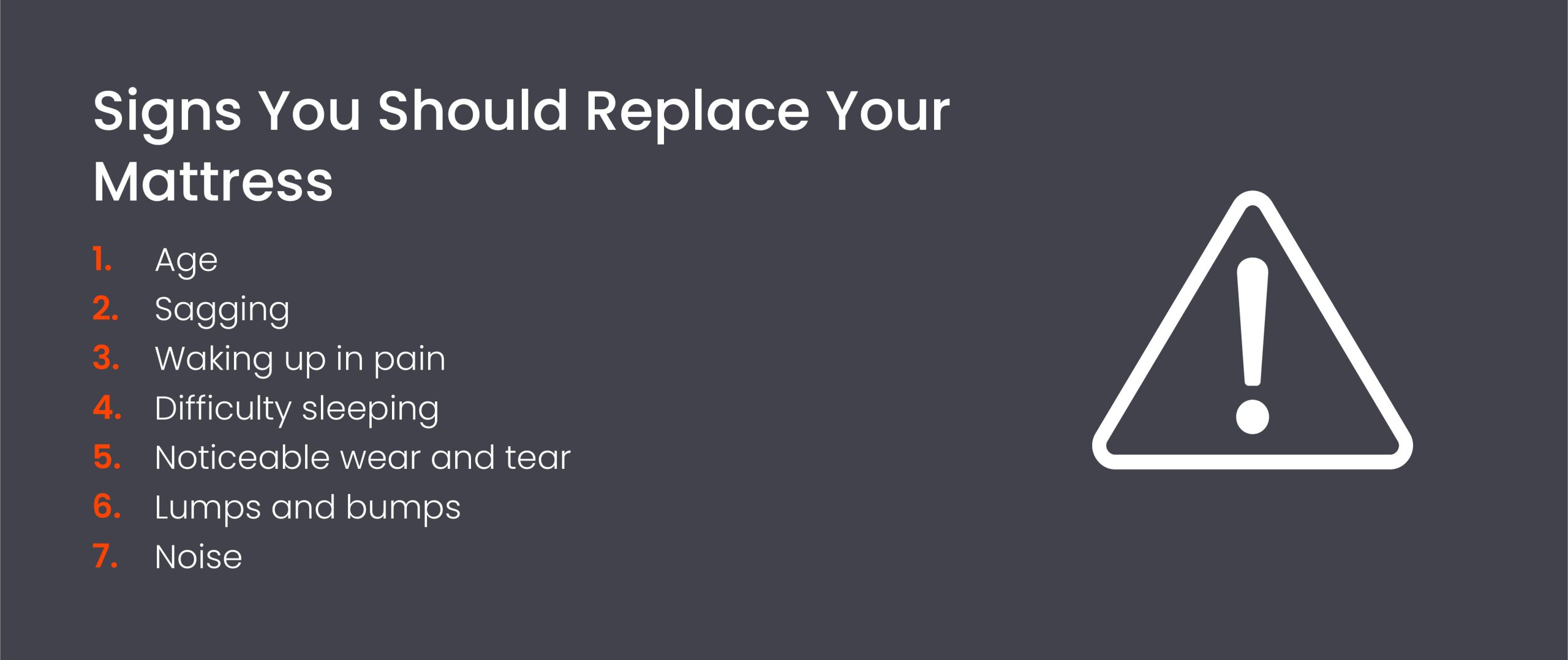
Age
Of course, you should never purchase a new mattress just because you’ve had your current mattress for seven years. In fact, many mattresses last more than seven years. For example, as we just discussed, latex foam mattresses can last up to fifteen years as long as they’re properly cared for. That being said, age does play a role in when it’s time to replace a mattress.
No mattress can last forever, and most will start to show signs of aging around seven to ten years after you purchased them. While these numbers should only serve as guidelines, you may start to notice your mattress looks and feels differently around year seven, which might be a sign that you need a new one.
Sagging
Mattresses should never be saggy because it means your back, hips, spine, and neck will never be in proper alignment, which can lead to aches and pains throughout the night and the next day. In addition, mattresses naturally soften over time but sagging means that your mattress has softened too much in one area. Sagging could be visually noticeable, or you might feel it when lying at night. Sleeping on a sagging mattress is uncomfortable and can hurt your body, leading you to feel sore the next day.
Waking up in pain
If you wake up in pain, it might not be because you slept funny. Instead, it could mean that there’s something wrong with your mattress you can’t see with the naked eye. Old mattresses become saggy and even get lumps and bumps that result in an inability to support your body correctly. When you lie down on your bed, your weight should be evenly distributed. However, if your body isn’t properly supported, you could have aches and pains the next day, especially in the hips, back, and neck.
Difficulty sleeping
There are many reasons you might have difficulty sleeping– some that might have nothing to do with your mattress at all. However, many people can’t sleep when they’re uncomfortable, so you might not get the quality sleep you need if you don’t have a comfortable mattress. Mattresses are designed for one thing – to help you sleep. However, if they’re not helping you sleep, then it’s time to replace them.
Noticeable wear and tear
With some mattresses, you can’t see if there are any lumps or bumps on the surface. However, you might be able to feel problems within your mattress. If you rub your hand gently over the mattress, it should feel the same in every spot. However, your mattress can’t get better again if you notice any worn edges, rips, or lumps. Instead, the lumps will get bigger, and your mattress will become even more uncomfortable as time goes on.
Lumps and bumps
We’ve already talked a lot about lumps and bumps, but they are a significant contributing factor to the comfort of your bed. If your mattress has lumps and bumps, it cannot properly support your weight, so you can’t put your spine, back, neck, and hips in proper alignment throughout the night. In addition, lumps and bumps can make you uncomfortable and lead to soreness the next day.
Noise
Noise typically pertains to spring or hybrid mattresses because memory foam mattresses don’t make much sound. While it’s normal for a spring mattress to make a little bit of sound if you were to jump on it, it should not make any sounds throughout the night. If you’re hearing noises coming from your mattress, it means something could be wrong with the springs. If there is a problem with the springs, you can expect it to only get worse. Over time, the springs can break, which can create a danger zone on your mattress, especially if the spring starts poking out of the material.
Of course, there are other times when you might want to replace your mattress. For example, if you’ll be sharing your mattress with a partner or a pet, you might want a larger bed. Learn the differences between king vs. queen beds, or check out our mattress size guide to help you choose the right one for your needs.
Factors That Affect a Mattress’s Lifespan
While the average lifespan of a mattress is seven to ten years, there are ways you can increase your mattress’s lifespan. At the very least, you should understand what not to do with a mattress to ensure it will last a little while. Mattresses are expensive purchases, so it’s always best to properly care for them so you can help them last as long as possible before replacing them. Here are factors that can affect a mattress’s lifespan.
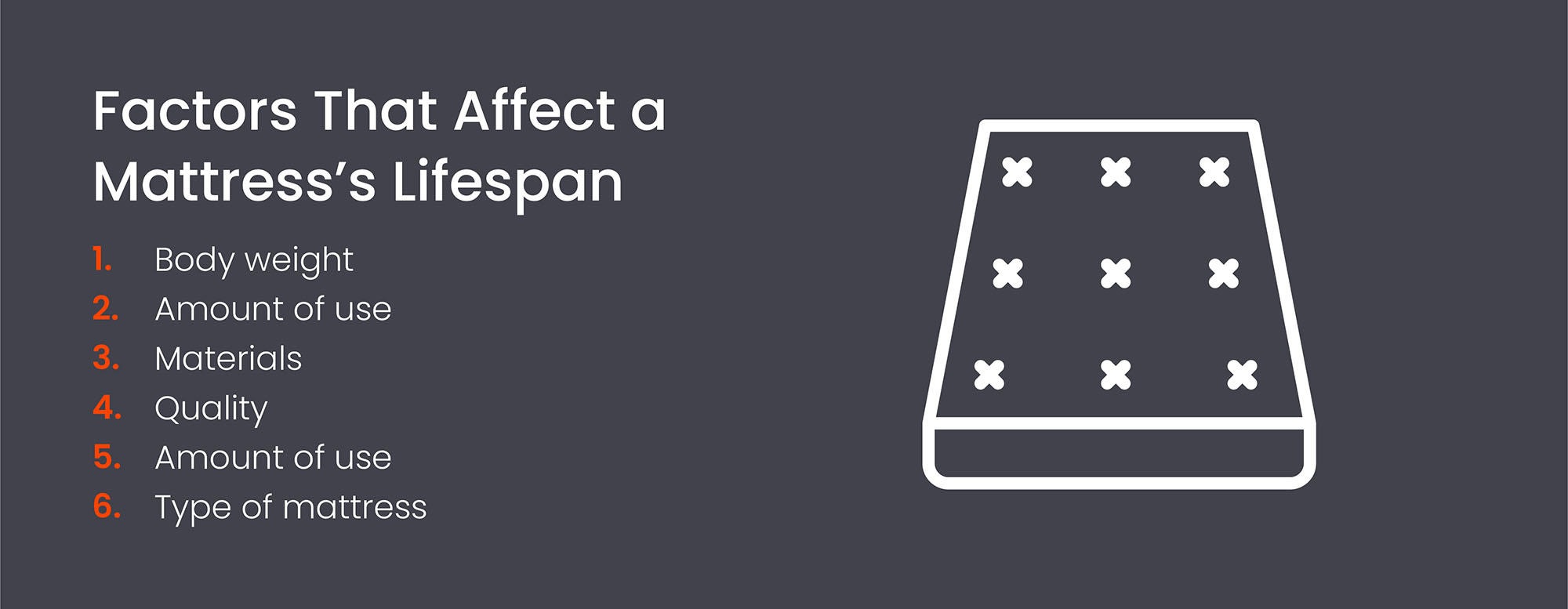
Bodyweight
Those with heavier weights can cause wear faster than those who are lighter. Additionally, your sleep position might also affect your mattress’ lifespan. For example, side sleepers typically increase sagginess in a particular area of the mattress, where their hips dig into the material. On the other hand, those who sleep on their backs may be able to keep their mattresses for longer because their weight is evenly distributed.
Amount of use
How often you use your mattress will determine how long it lasts. Ultimately, the more a mattress is used, the faster it will wear. So if you spend too much time in bed, you could be reducing your mattress’s lifespan quicker than if you just used your bed to sleep.
Materials
The materials used in a mattress impact the mattress’s lifespan. We already discussed how different types of mattresses have different life expectancies, so finding high-quality materials, such as latex, means your mattress will likely last longer as long as you take proper care of it.
Quality
The quality of the mattress also plays a role in how long it lasts. Unfortunately, quality mattresses are more expensive, but they can save you money because it means replacing your mattress less often.
Type of mattress
The type of materials used in mattresses can dictate the type of mattress you have. For example, if your mattress is memory foam, it is made out of memory foam material. The type of mattress has an impact on a mattress’s longevity. Latex mattresses typically last for more than a decade, while innerspring mattresses should be replaced every seven or eight years, especially if they have a broken spring.
Of course, it’s also important to properly care for your mattress. If you’re not washing your sheets, you might have bed bugs and mold that will require you to replace your mattress quickly.
How to Prolong the Lifespan of Your Mattress
Prolonging the lifespan of your mattress can help you save money in the long run because it means replacing your mattress less often. Here are some ways you can take better care of your mattress to keep it for longer.
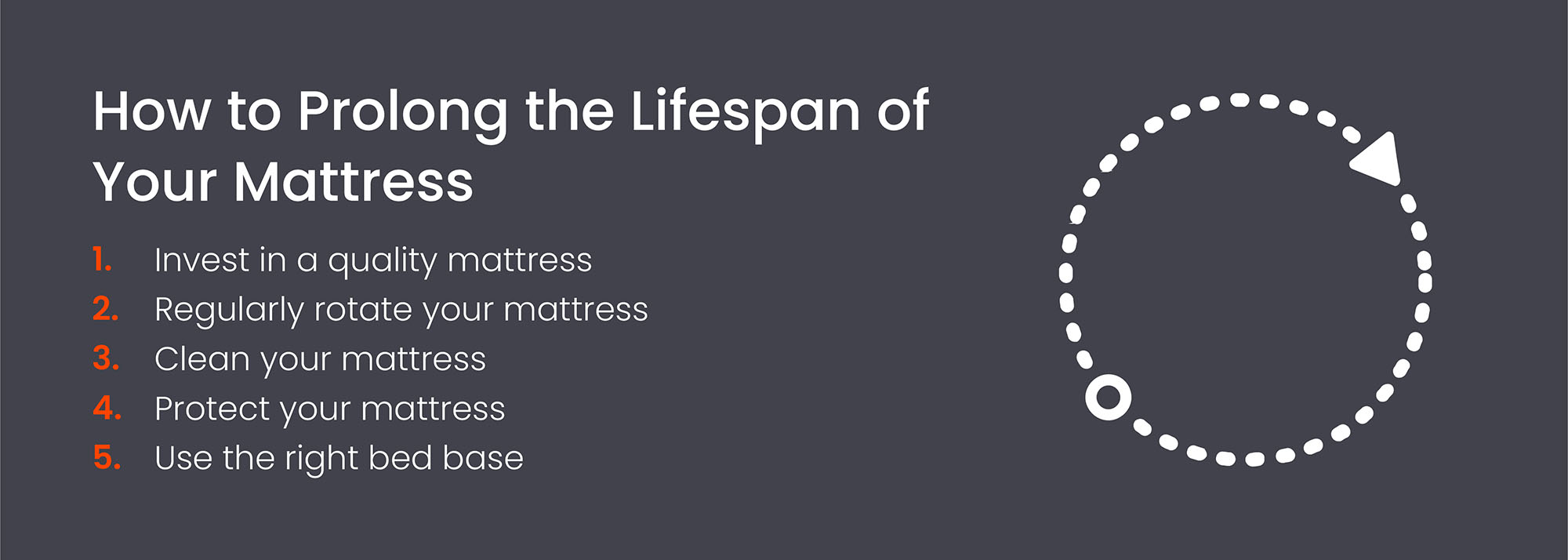
Invest in a quality mattress
Having a quality mattress means having a mattress that will ultimately last longer than a cheap one. Look for high-density memory foam and latex mattresses that can help prevent sagging.
Regularly rotate your mattress
Rotating your mattress allows you to evenly distribute your weight across the entire mattress to prevent you from creating wear in a single spot.
Clean your mattress
Keeping your mattress clean will ensure no dust buildup can result in mold, mildew, bed bugs, and allergies that all prevent you from getting a good night’s rest.
Protect your mattress
Mattress protectors can help you keep your mattress safe from spills, crumbs, and dead skin cells that fall off of you during your sleep and can make your mattress dirty. While there are ways to clean your mattress, it’s better to keep it protected.
Use the right bed base
There are many different types of bed bases, and some of them are better than others. You can check with the manufacturer or care instructions for your mattress to determine which type of bed base is right for your mattress. Your bed base is responsible for ensuring your mattress can keep your body in proper alignment, so getting the right bed base to support you while you sleep on your mattress is crucial. Additionally, bed bases can help prevent sagging, lumps, and bumps by keeping your mattress fully supported based on the materials used.
Layla Sleep Mattresses
Layla offers two mattresses to help any type of sleeper. Whether you sleep on your stomach, back, side, or in different positions throughout the night, Layla’s mattresses are designed to support your body and provide ultimate comfort. The Layla Memory Foam Mattress offers flippable firmness to provide you with two different options for mattress firmness. Your mattress is cool, clean, and supportive with a copper gel infusion.
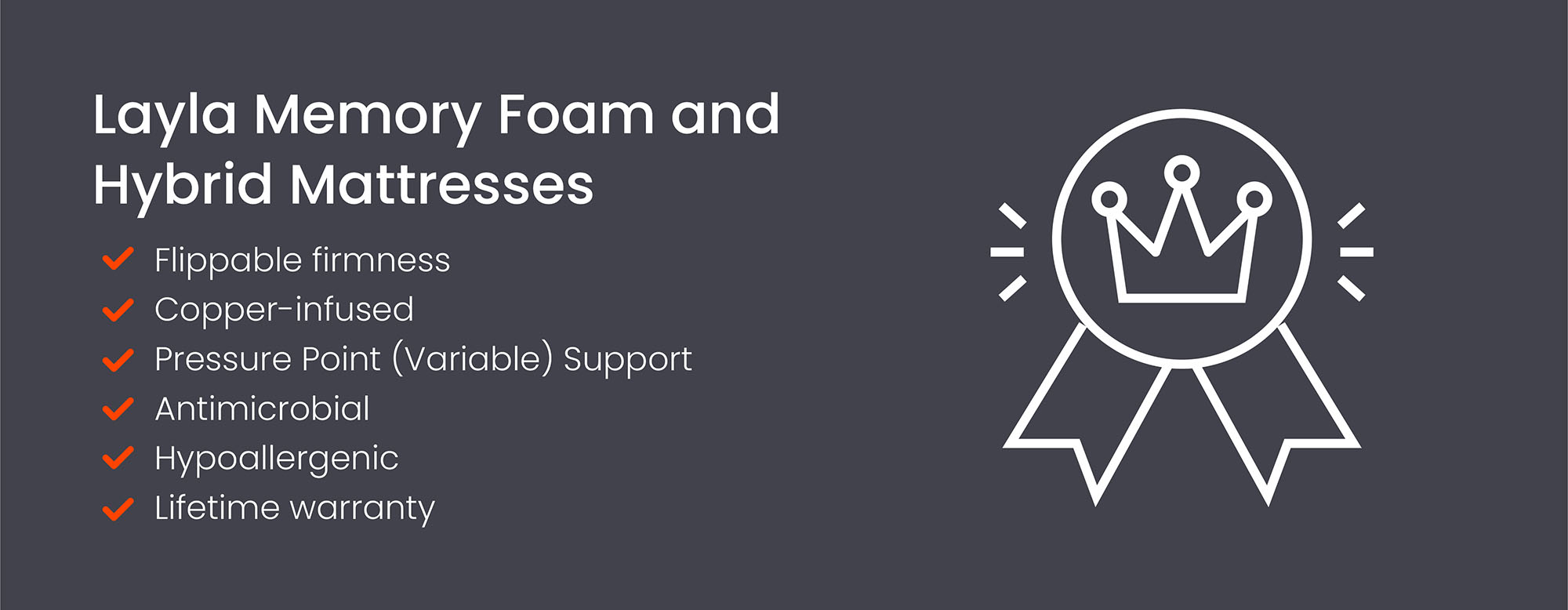
The Layla Hybrid Mattress can support your body with a more traditional feel with springs and specialty foams while offering the cooling comfort and support of copper-infused foam to transfer heat away from your body, offering the best of both worlds. In addition, like the Layla Memory Foam Mattress, the Layla Hybrid offers flippable firmness to help you find the right firmness for you.
Key Takeaways: How Long Does a Mattress Last?
The average lifespan of a mattress is seven to ten years. However, there are many factors that impact how long your mattress will last, including how well you take care of it, the type of mattress, age, materials, and quality. Luckily, there are many ways you can prolong the life of your mattress to help you save money and sleep in comfort every night, including rotating your mattress, investing in a quality mattress that doesn’t need to be replaced as often, and using the right bed base to support your body and reduce the chances of sagging.
If you’re not sure whether your mattress needs to be replaced, consider taking a look at it and thinking about how well you sleep. If you’re not sleeping well anymore, it could mean it’s time for a new mattress. Not sure what type of mattress you need? Learn how to choose a mattress with our mattress buying guide.





